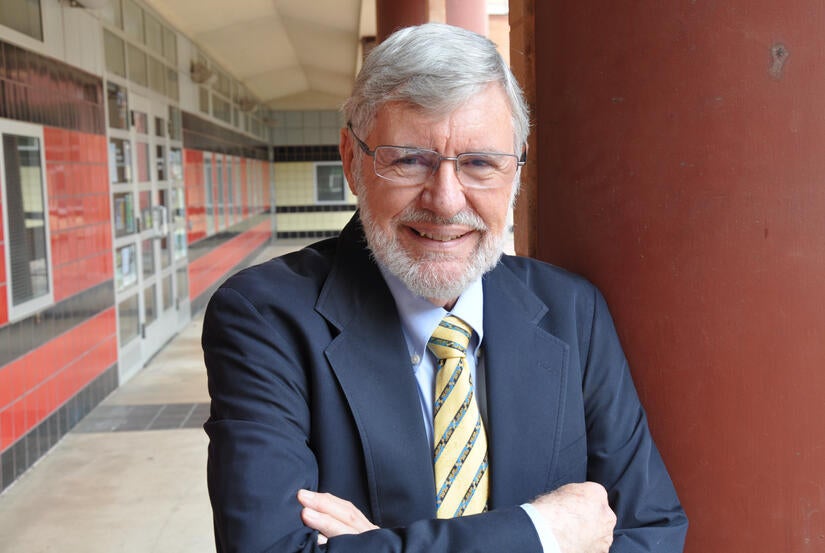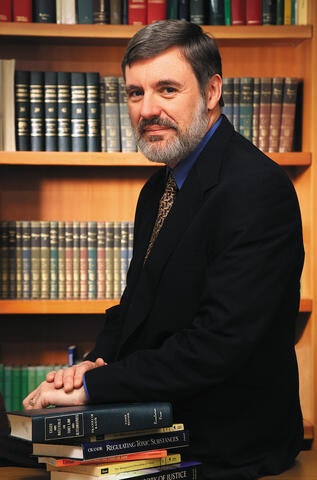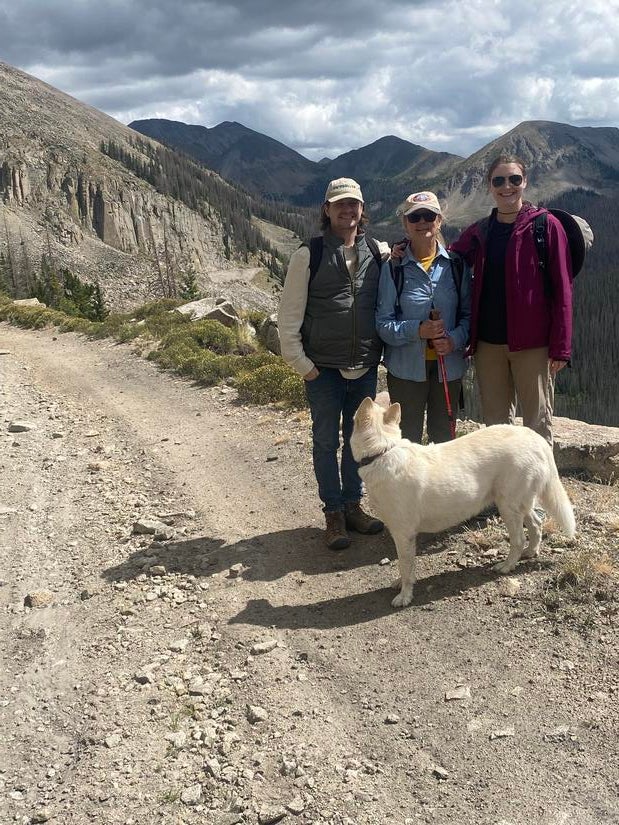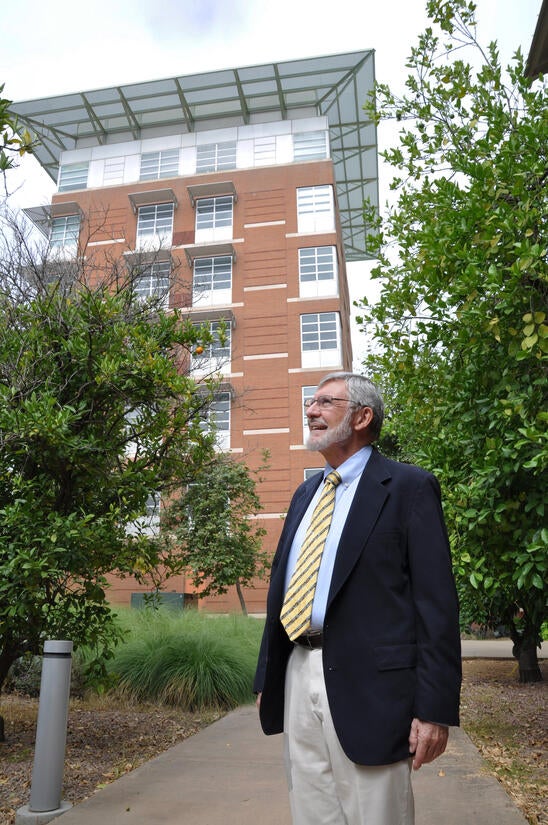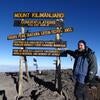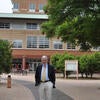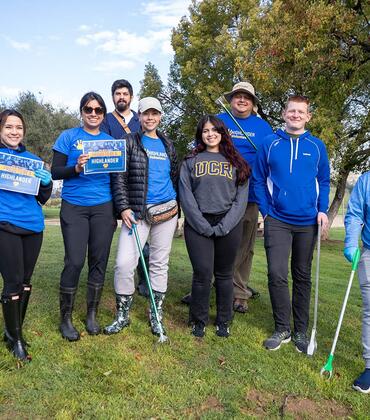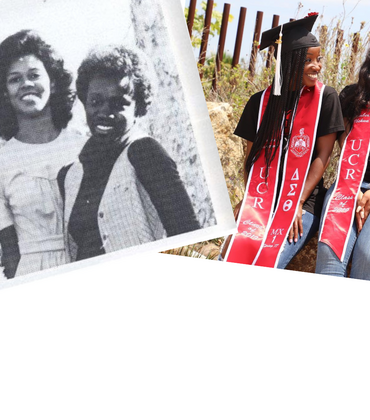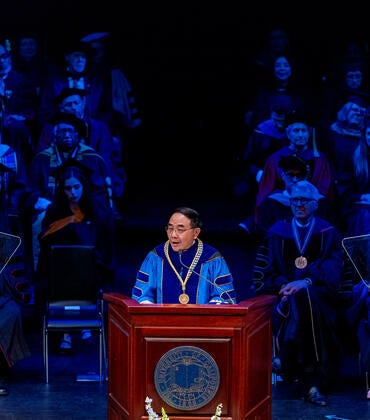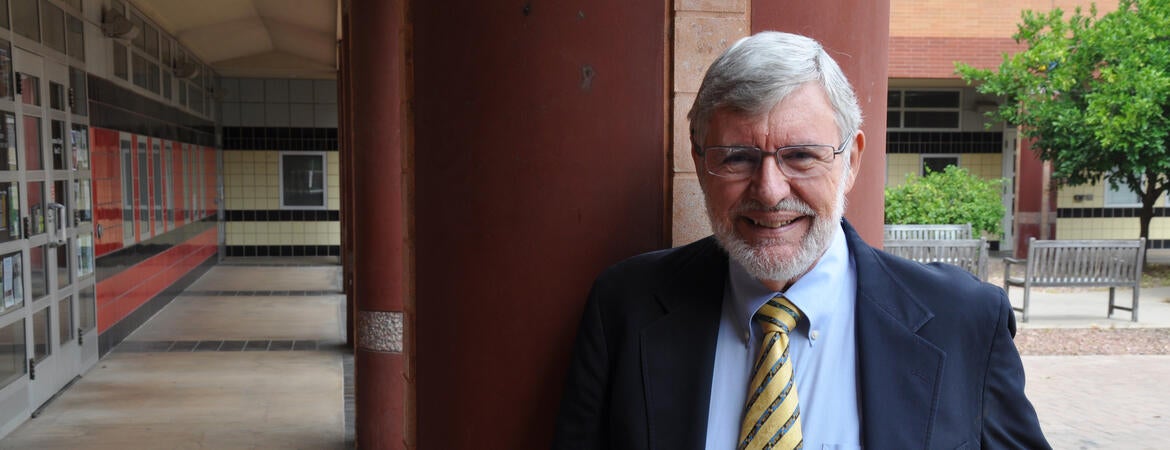
Carl F. Cranor celebrated his 28th birthday by taking up a new hobby: running.
More than five decades later, he’s still trekking about 20 miles a week. Ten years ago, he hiked Mount Kilimanjaro, Africa’s tallest mountain. His focus and his determination on healthy living have been heavily influenced by what has given him a unique area of expertise: the combination of philosophy, science, and law, making him one of the country’s renown environmental experts.
This June, Cranor, 80, will be part of a group of long-time professors retiring from UC Riverside. He is a distinguished professor of philosophy with UCR’s College of Humanities, Arts, and Social Sciences, also known as CHASS. For Cranor, the end of this academic year seals 53 years of teaching, all of them at UCR. Upon retirement, he plans to continue logging in 10 to 20 weekly mile runs, spend time with his wife, Crystal Cranor, and teach an occasional course at UCR. A second visit to Mount Kilimanjaro is also under consideration.
“When I think about it, I’ve had a very unusual academic career: I’ve helped modify the law, testified about the law, written about it. I’ve also tried to do a good job in the many factors of UCR life,” said Cranor, a distinguished professor of philosophy working on his 11th book. During his tenure at UCR, he has chaired five UCR departments, published 10 books, and conducted extensive research on toxicological, occupational, and environmental issues in the law. His articles have appeared in philosophic, scientific and law journals, including The American Philosophical Quarterly; Ethics, Law and Philosophy; The Yale Law Journal, Environmental Toxicology and Pharmacology; European Journal of Oncology; Jurimetrics: The Journal of Law, Science and Technology; and the American Journal of Public Health.
Cranor’s expertise in philosophical issues concerning risks, science, and the law, has been used in several court cases. Some lawyers have cited his work, others have called him to serve as consultant. From 2012-15 Cranor consulted for the National Oceanic and Atmospheric Administration and the United States Department of Justice case concerning the 2010 Deepwater Horizon BP oil spill in the Gulf of Mexico, which resulted in a $21 billion settlement. In 2012 he also served as a consultant for the U.S. District Court for the Southern District of Florida regarding denture cream products.
Most recently, in 2023, he was called as an expert for a Nevada criminal case to explain the adverse impacts of toxins in the brain. Cranor said a man accused of murder had apparently been exposed to toxic chemicals since he was in the womb and early childhood, causing erratic behavior through adulthood. Partly because of Cranor’s report, the man’s conviction was reduced to life in prison, instead of the death penalty.
“I never thought my work would save a man’s life. I think of that often,” said Cranor, drawing a gentle smile across his furrowed rosy cheeks.
Cranor’s legacy at UCR is well-recognized, said Andrews Reath, Department of Philosophy professor and chair.
“Carl began to work on philosophical and ethical issues at the intersection of law, science, risk assessment and public health, with special focus on the regulation of toxic substances. It is fair to say that he went on to become a leading world expert on this cluster of issues, bringing his background in ethics to bear on legal and regulatory issues concerning toxic substances,” Reath said. “He has made many contributions to our campus. He was one of the founders and has been a mainstay of the Law and Society Program. He spent 10 years in the CHASS Dean’s office, nine as associate dean of the college and one as interim dean … Carl is to be congratulated for a stellar and very successful career.”
Explaining how toxins impact a person’s health was also part of one of Cranor’s recent 60-student class. He asked students to watch films such as “Dark Waters” and gave example after example of cases that prove how medications, such as Thalidomide in the 1960s, resulted in women having babies with spinal malformation or shortened limbs, or who were stillborn. He also discussed prenatal exposure to a synthetic estrogen called diethylstilbestrol or DES, prescribed to pregnant women in the 1940s-70s to prevent miscarriages or other pregnancy-related complications. Researchers found that women who took DES gave birth to girls, who at around age 20 developed cervical/vaginal cancer. The mothers who took DES and their female children were found to have higher risks of developing breast cancer.
Why do those issues matter? It’s all about informing and trying to protect the public. It’s a legal and moral obligation, Cranor said.
Cranor’s interest in combining morality and environmental health issues deepened during his one-year master of studies in law at the Yale Law School in 1981.
“I loved that year, I was like a dry sponge, waiting to be saturated with all this knowledge and information,” Cranor said. “Other people partied Friday night, I stayed home reading legal cases.”
He also spent 1985-86 as a Congressional Fellow working with the late California Democrat Congressman George Brown, Jr. and in the Office of Technology Assessment conducting research on various topics, including carcinogens. During that year he understood how laws worked and how different agencies, such as the Environmental Protection Agency, function. Over time Cranor also honed in on women’s health and gestational diseases.
For Cranor, investigating these issues has a simple reason: “Things are happening all around us and our laws are not functioning very well,” he said. “We still don’t have enough protective laws to regulate things like lead, which by the way, an epidemiology study shows is associated with heart diseases. We also don’t have good control over how toxins are entering commerce because companies are not legally obligated to disclose this.”
Learning about these issues has influenced students in Cranor’s class. John Linarelli, now a professor of law at the University of Pittsburgh School of Law, said Cranor “is the best mentor a graduate student could possibly have.”
It was Cranor’s continued support and encouragement that prompted Linarelli to complete his doctoral degree in philosophy in 2015.
“Watching Carl in the classroom made me a better teacher. I have this memory of an undergraduate student in Carl’s very large Philosophy of Law class misunderstanding Rawls. Carl was so kind and patient in helping the student understand Rawls. As a teacher, he practiced an ethics of care in his teaching, benefitting countless students. All of us in academia benefit from his example,” said Linarelli, who is working on a research paper with Cranor.
One of Cranor’s first students at UCR was Thomas H. Cahraman. He graduated with a bachelor’s degree in political science in 1973. After law school Cahraman practiced law in Riverside and in 2001 was appointed as a superior court judge of Riverside County.
Cahraman, now retired, remembers taking several philosophy courses with Cranor, including legal philosophy. Various aspects of Cranor’s teachings and class discussions stuck with him, he said.
“By example, our discussions on the rationale of legal punishment came to mind frequently in 2008 and 2009 when I was doing a great deal of felony sentencing. We also discussed the distinction between conduct malum in se [inherently immoral act] and conduct classified as malum prohibitum [not inherently immoral act but prohibited by statute], and those discussions have returned to me many a time in handling various issues, such as child custody, wherein sociology and law intersect,” Cahraman said.
Another of Cranor’s students was Heinrik Hellwig, now a visiting assistant professor with Seton Hall University’s Department of Philosophy. During his time as a doctoral student at UCR, Hellwig recalls Cranor’s “trenchant criticisms, wise editing advice, crucial references, and above all, a lot of personal support.”
Now as a professor himself, Hellwig, who completed his doctoral degree in 2019, credits Cranor with knowing how to teach legal cases.
“Carl’s approach to legal philosophy really is different from what you see in a lot of the scholarship. One virtue of Carl’s approach is that if a philosopher can identify genuine philosophical issues within the law and propose solutions, their philosophy could significantly impact the community. Carl’s work has had that kind of impact. Not only was Carl asked to provide expert testimony in a federal case, his work on ‘Inference to the Best Explanation’ proved to be central to the outcome on appeal. I don't know of any other philosopher who can say that,” Hellwig said.
Outside the classroom, Cranor’s impact can also be seen in his long list of awards and recognitions. Among those is being an elected fellow of the Collegium Ramazzini, International Headquarters, Carpi, Italy and the American Association for the Advancement of Science. In 1976 he became involved with the UC Riverside Phi Beta Kappa Society chapter and seven years ago he created the national Phi Beta Kappa endowed Cranor Family Visiting Scholar position, which supports students from all across the United States.
At UCR, Cranor can often be seen walking from one building to another. He takes special pride in UCR’s iconic maroon College of Humanities, Arts, and Social Sciences (CHASS) building on the west side of campus.
In the early 1990s, as associate CHASS dean, he led a UCR faculty and staff committee that helped guide the development and design of the CHASS building. Cranor took it upon himself to contact the best architects in the country, including renowned Argentinian architect César Pelli — the man behind some of the world’s most unique buildings, including the Pacific Design Center in Los Angeles, the Torre de Cristal in Madrid, and the Petronas Towers in Malaysia.
Pelli designed the CHASS edifice, incorporating the iconic beige-yellow UCR brick and special touches of blue and gold. The courtyard features UCR’s citrus heritage with seating meant for relaxation or conversation. When he walks around, he marvels at the campus’ growth; when Cranor arrived in 1971, there were less than 6,000 students. UCR now boasts more than 26,000.
Dividing his attention to his own health, to campus, to his students, and his family is a work ethic he learned early on alongside his father in his native Colorado. They lived in a rural area where all the work on their ranch was done by hand and sometimes by horse-drawn rakes.
“My first bathroom was an outhouse,” said Cranor, uttering a loud laugh at the memory.
Being a ranch hand was not his ultimate goal, he admitted, so he attended the University of Colorado for undergraduate studies and then UCLA for graduate school. At UCLA he met one of his life-long friends, Craig Ihara. Ihara, now an emeritus professor of philosophy at Cal State Fullerton, said he recalls the days when he and Cranor paid 25 cents for a UCLA basketball and football game ticket. He also noted that Cranor had unparalleled courage to jump from a math undergraduate major to a philosophy doctoral program.
“I didn’t come from an Ivy League school in Colorado. In some respects, my background was not very different from many of the students here today,” said Cranor, a first-generation student.
The passion for his job and his patience have always been palpable, said Cranor’s daughter, Taylor, at his retirement dinner on May 10 at UCR ARTS in downtown Riverside. When they were kids and Cranor took her and her brother, Christopher, on road trips or long walks, he never lost his temper or gave in to their constant complaints, Taylor recalled. A tax attorney today, Taylor carries many of those lessons with her.
“There are three things I realized about my dad,” she said. “One, his strong sense of justice. Two, his capacity to consistently work toward a goal and have the capacity to take daunting challenges. And three, his love of learning. Teaching has brought him lots of satisfaction.”
As June winds down, Cranor remains focused on wrapping up the academic year. On a recent Monday morning he got up early, squeezed in a 4-mile run, and made it to campus for a 9:30 a.m. meeting.
